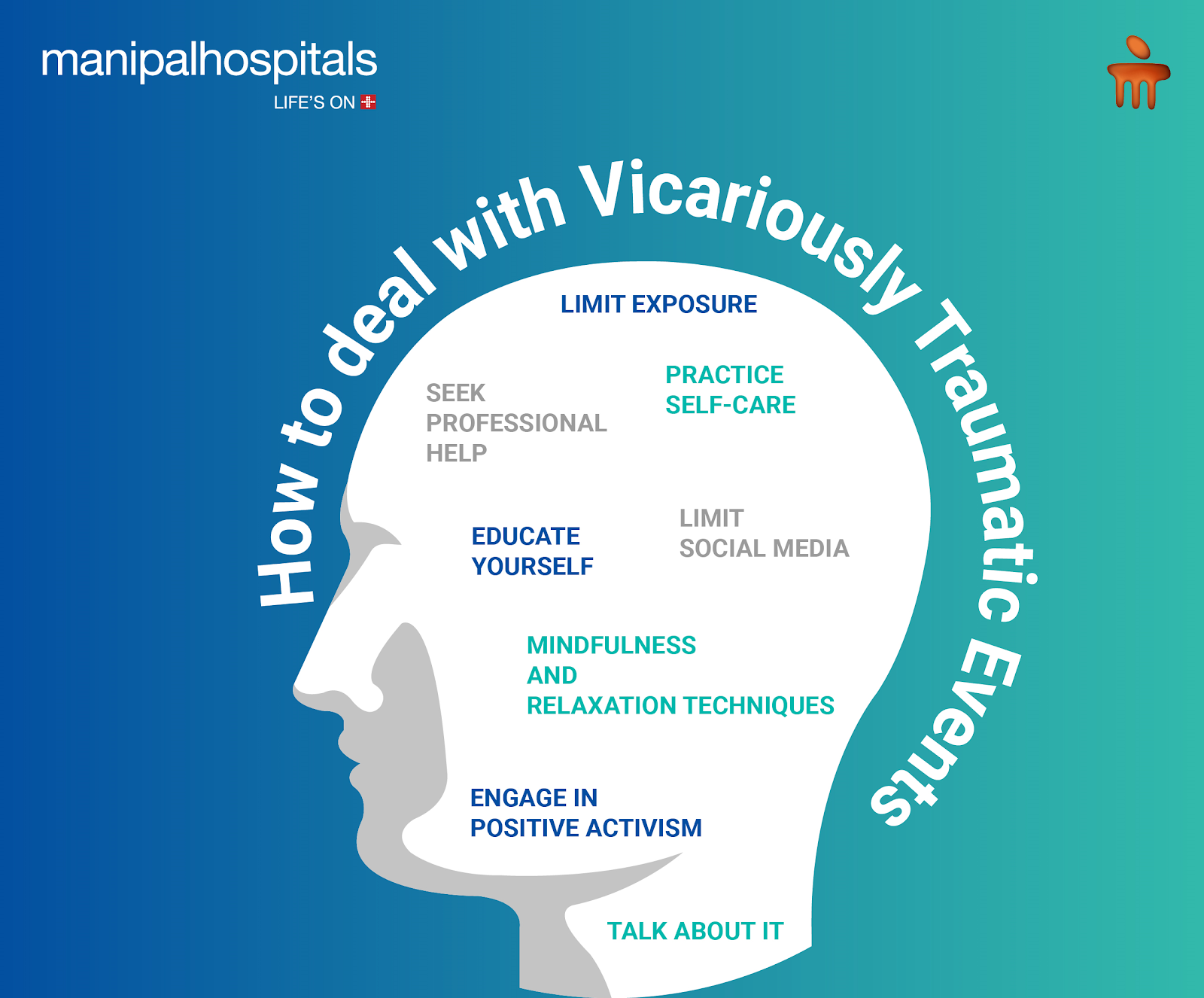
In the age of digitalization, where social media along with other news cycles flow information relentlessly, many of us are inadvertently exposed to a form of trauma known as public or vicarious trauma. It’s significant to explore the concept of public trauma, know its causes, and symptoms, who is most vulnerable and most importantly, how to heal from it. By understanding the impact of public trauma and equipping ourselves with coping strategies, we can better navigate the turbulent sea of information and protect our mental and emotional well-being.
What is Public Trauma?
Public trauma also referred to as vicarious trauma or secondary trauma, is a psychological and emotional response to witnessing or being exposed to traumatic events that happen to others, typically through media, social networks, or even direct interactions. While we may not have directly experienced the traumatic event, the sheer volume of information we encounter can have a profound impact on our mental and emotional state.
Causes of Reaction to Public Trauma
1. Media Overexposure: One of the primary causes of public trauma is the constant barrage of traumatic events through media outlets. News stories, images, and videos depicting violence, natural disasters, accidents, or other distressing events can evoke strong emotional responses in viewers.
2. Social Media and the 24/7 News Cycle: Social media platforms amplify the spread of traumatic content, often leading to a feeling of being overwhelmed. The constant updates and discussions surrounding these events can make it difficult to escape or disconnect from distressing news.
3. Empathy and Compassion: Human beings are naturally empathetic creatures. When we see others suffering, our hearts ache, and we can carry the emotional burden of their trauma, even if we are not directly connected to the individuals involved.
4. Personal Experience: Some individuals may have a history of trauma in their own lives, and exposure to public trauma can trigger their own unresolved emotions, leading to heightened reactions.
Symptoms of Public Trauma
Public trauma can manifest in a variety of ways, and the symptoms may vary from person to person. However, some common signs of vicarious trauma include:
1. Emotional Distress: Feelings of sadness, anxiety, anger, or helplessness are common emotional responses to traumatic events.
2. Intrusive Thoughts: Recurring thoughts or images related to the traumatic event can invade one's mind.
3. Sleep Disturbances: Difficulty falling asleep, staying asleep, or experiencing nightmares can be a result of public trauma.
4. Physical Symptoms: Some may experience physical symptoms such as headaches, stomach aches, or muscle tension due to emotional stress.
5. Avoidance Behaviour: Individuals might avoid news, social media, or discussions related to the traumatic event to cope with their distress.
Who's Most Vulnerable to Vicarious Trauma?
While post-traumatic stress disorder can affect anyone, certain groups may be more vulnerable:
1. First Responders and Healthcare Workers: Those in professions that routinely deal with traumatic events, such as paramedics, firefighters, and healthcare providers, are at higher risk.
2. Journalists and Reporters: Professionals covering traumatic news stories can develop vicarious trauma from their constant exposure to distressing events.
3. Empathetic Individuals: People with a high level of empathy or those who have experienced personal trauma may be more susceptible to vicarious trauma.
4. Social Media Users: Those who spend significant time on social media platforms, where traumatic content is easily accessible, may be more vulnerable.
How to Mitigate Vicarious Trauma and Cope with Public Trauma

1. Limit Exposure: Recognise your limits and set boundaries. It's essential to stay informed, but excessive exposure to traumatic content can be harmful. Choose trusted news sources and allocate specific times for news consumption.
2. Practice Self-Care: Engage in self-care activities such as meditation, exercise, hobbies, or spending time with loved ones. These activities help in managing stress and promoting emotional well-being.
3. Seek Professional Help: If you find yourself struggling to cope with public trauma, don't hesitate to seek help from a top psychologist in Kolkata or a counsellor. They can guide you for stress disorders and coping strategies tailored to your needs.
4. Talk About It: Share your feelings with friends, family, or support groups. Talking about your emotions can provide relief and create a support system.
5. Mindfulness and Relaxation Techniques: Mindfulness meditation and relaxation exercises can help you stay grounded and reduce anxiety in the face of distressing news.
6. Limit Social Media: Consider reducing your social media usage or unfollowing accounts that frequently share traumatic content. You have control over what you see on your feeds.
7. Engage in Positive Activism: Channel your empathy and compassion into positive action, such as volunteering or supporting organizations that address the issues you care about.
8. Educate Yourself: Understanding the psychological impact of public trauma can help you navigate it more effectively. Knowing that your reactions are normal can provide some relief.
Public or vicarious trauma is a complex mental issue and is often overlooked. As we navigate the digital age, it’s essential to protect our mental and emotional well-being by recognizing the signs and symptoms of it, understanding its causes and implementing coping strategies. This not only helps us heal from it but also will contribute to a more compassionate and empathetic society, where the burden of public trauma is collectively lighter.



















 4 Min Read
4 Min Read












